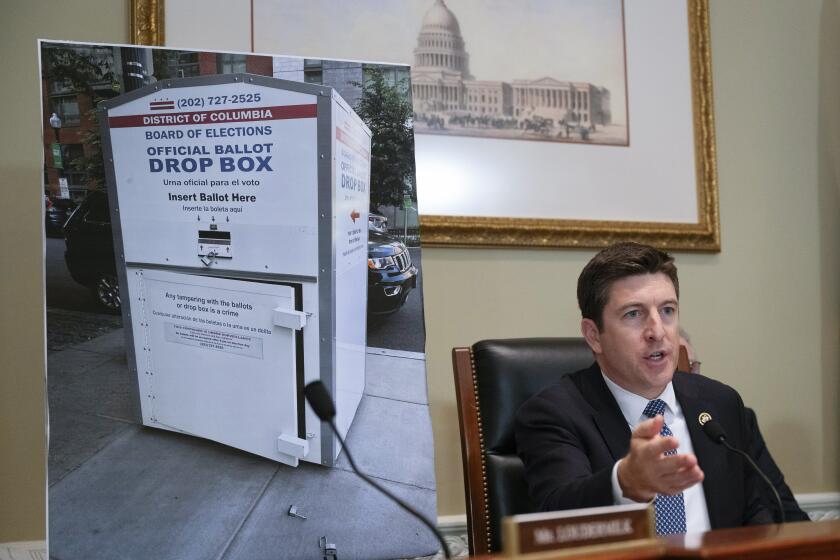Mistake Jeopardizes an American Dream
He came to America seeking the chance to work hard and make something of himself. He built a successful business and a loving family.
But Jose Carlos Cruz Melendez made one mistake, and it threatened to destroy everything.
Just as he was poised to become a U.S. citizen, he was ordered deported under a federal law that punishes immigrants with criminal records -- even those who have served their sentences.
As a noncitizen, no judge or jury could save him. His only hope was a pardon from the governor, a measure of redemption granted to only a few people each year.
In the end, his fate would turn on the words of a most unlikely champion.
Carlos Cruz, as he’s called by family and friends, was born Sept. 29, 1966, in a remote El Salvador village, without running water, electricity, schools or doctors. His parents grew beans and corn to feed their nine children, who one by one left to seek a better life in the United States.
Carlos first fell in love with the United States when he was 8, reading letters from his siblings up north to his illiterate parents.
“They said it was hard work, but a lot of chances,” he said.
At 15, he sneaked across the border and traveled with his sister to Connell, Wash., to pick asparagus.
His family reunited in the orchards during cherry season. A friend remembers when the newly arrived teenager asked for a second hamburger at lunch. Twenty years later, the men in the orchards still laugh about Carlos Cruz: the boy who always wanted more.
Soon Cruz got steadier work at a potato factory, each week putting $30 into savings. After five years, he qualified for an amnesty program and became a legal permanent resident.
He bought a van with his savings and started his own business serving Mexican food to field workers from his mobile restaurant.
He made $7 the first day.
Business grew, and he bought another van. His sisters and brothers moved to the area and set up taco vans, each in a different city so they wouldn’t compete.
“I have never seen anybody work so hard in my life as I’ve seen these guys,” said Phil Brown, a Wenatchee native that Cruz met when he rented storefront space in Brown’s coin laundry. “They are the perfect type of person that I could see come to America.”
As Cruz established his business and family, he got interested in Wenatchee politics. He wanted to vote.
To do so, he needed to become a citizen. In 1997, he took classes and aced the test on American government. Soon after he got a letter from the Immigration and Naturalization Service inviting him to Yakima for an interview.
This was it, he thought.
On a September morning, he drove his newly washed car to Yakima. Once there, Cruz watched eagerly as an immigration officer scrutinized his green card.
“You’re under arrest,” the officer said flatly.
“Why?” Cruz asked.
“You’re a criminal,” the officer said. “You’re going back to your country.”
Cruz was handcuffed and put in an INS van, traveling the same road he had driven so optimistically 10 minutes before. He watched as Yakima faded in the distance.
*
The Yakima meeting was a sting to catch criminal immigrants. A 1996 law requires automatic deportation of noncitizens who have committed a variety of crimes, even after they have served their time.
Cruz’ crime: statutory rape.
Cruz was 24; Renee said she was 17, although she was really 14. They met at a community dance. Cruz was looking for a girlfriend, maybe a wife. Renee was looking for a boyfriend, maybe an escape from her troubled home life.
Cruz was a source of support as Renee was shuffled from her mother’s home to her grandmother, then to a group home. Their friendship turned to romance when she was 15.
“I was attracted to Carlos’ goodness and strength,” she recalled. “He was very generous and open, the kind of person that would stop to help someone change a flat tire on the side of the road.”
In 1993, Renee ran away from her group home and straight to Cruz’s door. Police found her after she left his house the next morning.
An officer visited Cruz at work the next day.
Cruz was shocked to learn that having sex with Renee was illegal. In El Salvador, a 25-year-old man dating a 17-year-old girl would be acceptable.
He was arrested and charged with communicating with a minor for immoral purposes, a misdemeanor, and third-degree rape of a child -- also known as statutory rape. He admitted everything.
He was sentenced to and successfully completed 120 days of work release, 36 months of community supervision and 24 months of outpatient sex offender treatment. In therapy, he says, he came to understand why it was wrong to date a teenager.
He adhered to the no-contact order, even when Renee tried to call him. By the time his probation ended and Renee turned 18, she had a new boyfriend. Both moved on.
Cruz married a few years later, to a Mexican immigrant his own age. They met when she visited his taco van and teased him about working all the time.
They bought a house in Wenatchee and had three children: Bianca, now 6; Nancy, 4, and Carlos Jr., 2.
As the father of two girls, Cruz now says he’d go through the roof if an older man dated one of his daughters as a teen.
“I know how bad was my crime,” he said.
Whatever his regrets, the law said he must be deported.
*
Cruz and Seattle attorney Robert Gibbs started searching for loopholes in the deportation order. The courts rejected their argument that Cruz didn’t understand English at the time of his plea.
Gibbs petitioned the Supreme Court twice, unsuccessfully. By late 2000, time was running out on him.
Gibbs told his client that immigration officers could take him away at any time. Cruz warned his wife Lucy not to answer the door.
Lucy said she and the children would come with him to El Salvador, a country she’d never seen. But he didn’t want his children to grow up in the poverty he’d worked so hard to escape.
Cruz visited his friend Phil Brown at his coin laundry late one night, after work.
Brown recalls that Cruz had tears in his eyes as he said, “I can’t let this happen to me -- my family needs me.”
Presented with a seemingly hopeless case, Gibbs tried a longshot -- seeking a pardon from the governor. Gov. Gary Locke grants only half a dozen pardons and commutations a year.
They gathered court documents and letters from people who knew Cruz, from his therapist to his priest, family and business associates.
But the person who most impressed the state Clemency and Pardons Board was a voice from Cruz’s past:
“My name is Renee Arceo,” she wrote. “Although the state describes me as the ‘victim’ of this crime, I do not and have never thought of myself in this way.”
Now 23, working as a secretary and the mother of two children, Renee Arceo told the pardons board about her relationship with Cruz in an affidavit and in person at the hearing last year.
“He had a very giving heart. He was also a hard worker, and had a steady job and a vision of what he wanted his life to be like. These were all things that I needed in my unstable life.”
The five members of the board listened carefully. Victims often testify at pardon hearings, but rarely on the side of the criminal.
They questioned Renee about her family, the police report and Cruz.
“I was in love with him,” she said. “I don’t think he’s any threat to society at all.”
The board had heard enough.
That day, they voted unanimously to recommend that Cruz be pardoned and thus allowed to stay in the country.
Their recommendation went to the governor.
*
Cruz was working in his taco van in February when Gibbs called.
“I have really good news,” Gibbs said.
The governor said yes.
“You’re not kidding me?” Cruz asked. He felt as if Gibbs had given him his life back.
To celebrate, he went shopping for a new taco van for his sister, who’d just gotten her green card. That day, Cruz said he felt: “We belong to this country.”
On July 4, he helped harvest cherries from an orchard he manages, then hosted a barbecue and lit fireworks.
During Cruz’s five-year legal battle, he says he never stopped believing that America would give him a second chance.
He has resubmitted his citizenship application to the INS and hopes for a reply soon.
More to Read
Start your day right
Sign up for Essential California for news, features and recommendations from the L.A. Times and beyond in your inbox six days a week.
You may occasionally receive promotional content from the Los Angeles Times.






